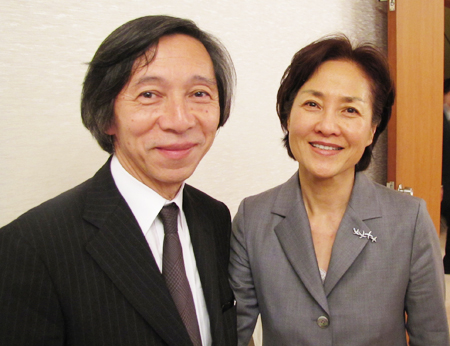THE KOREA TIMES 3-18-2012
NEWS ZONE SPECIAL
Envoy thanks Koreans on tsunami anniversary

By Philip Iglauer
The tsunami that devastated coastal towns in northern Japan on March 11, 2011 moved Sunshine
Lee in Korea to write hundreds of tanka poems, her personal and heartfelt way to ease the suffering of thousands of Japanese.
After prayer and reflection she wrote over 200 tanka poems, many about the tsunami that devastated the region.
Thousands of other Koreans similarly moved extended help and encouragement to their East Asian neighbor, including millions of dollars in disaster relief.
Lee's poems were later published in a book in Korea last year titled "How Can There Be Only
Spring in Life "
The Japanese Embassy here marked the anniversary of the natural disaster, sometimes called the “311 Earthquake” by hosting a reception to recognize more than two dozens Korean media outlets including The Korea Times, rescue teams, NGOs and the Korean Red Cross at Japanese Ambassador to Korea Masatoshi Muto’s official residence in Seongbuk-dong Seoul, Wednesday.
Muto highlighted Lee’s poignant and uplifting poetry by reading two poems from her book in Korean. Muto also thanked Koreans for coming to Japan’s side at his country’s dire time of need saying, in welcome remarks during the reception, how encouraged he felt seeing placards in the streets of Seoul that read ‘We Support You, Japan.'
Lee’s tanka poetry was published with the title “The Flower Blooms because of Your Heart” on March 11 in Japan to further mark the anniversary of the disaster.
“If my mother were alive, I thought, she would have written the powerful one-line poem to comfort the Japanese people. That is when a friend of mine in Japan suggested I pray about it.”
Lee, Presbyterian, did exactly that. What came from her meditations were hundreds of terse and emotion-filled poems.
“As I heard news about disaster came out, some 200 Tanka poems flowed from me in just two or three days.
Lee’s mother was regarded as the only great Korean writer of Japanese traditional poetry.
Son Ho-yun, who died in 2003 at the age of 80 had published six volumes of tanka,
Japanese poems of 31 syllables in Japan.
She was well known in Japan ― she had been invited by the Japanese Emperor to a New Year’s poetry reading at the Imperial Palace in Tokyo but obscured by disregard or disapproval in Korea.
In Aomori Japan there is even a monument erected to honor Poet Son.
"My mom had written tanka all her life in Korea but was never recognized by Koreans until she went away " Lee said. "If she were alive she would have been so sad and would have written a beautiful one-line poem to give true comfort to the Japanese people who recognized her as the great poet"
